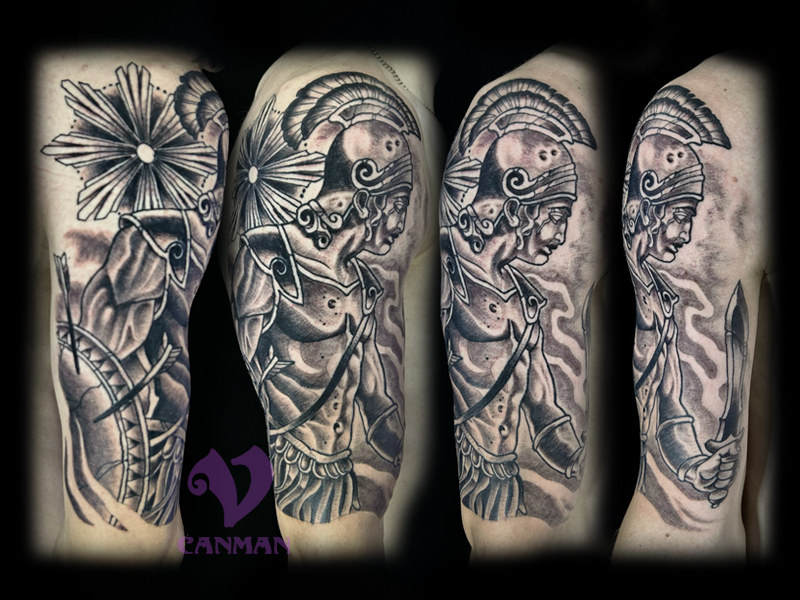This Achilles tattoo is created by Canman.
The client wanted the tattoo Black and grey.
Canman used references of classic sculptures to design the image.
Achilles’ story has been a source of inspiration in literature, art, and popular culture for centuries
The Achilles tattoo explores themes of heroism, honor, pride, and the human condition.Interested in a mythology or black and grey type tattoo?
Go to our Tattoo Request Form to get you tattoo project started!
History of Achilles
Achilles is a prominent figure in Greek mythology.
He is known for his exceptional strength, bravery, and tragic fate.
Also, He is one of the central characters in Homer’s epic poems, the Iliad.
This poem narrates the events of the Trojan War.
Achilles was the son of the mortal king Peleus and the sea nymph Thetis.
Thetis tried to make Achilles immortal by dipping him in the River Styx.
She held him by the heel, leaving that part of his body vulnerable.
As a result, the term “Achilles’ heel” came to represent a person’s weak spot.
The end of Achilles
Achilles was summoned by the Greek army to join their forces in the war against Troy.
Therefore, he was a central figure in leading his troops, with unmatched skill and ferocity in battle.
However, Achilles becomes angry and withdraws from the battle due to a dispute.
this dispute is with king Agamemnon who had taken Achilles’ war prize, the maiden Briseis.
Consequently, this withdrawal impacted the Greek army’s performance in battle, and they suffered heavy losses.
Achilles’ best friend Patroclus, wears Achilles’ armor and enters the battle.
In an attempt to rally the Greeks while Achilles continues to sulk in his tent.
However, Patroclus is slain by the Trojan prince Hector, which deeply devastates Achilles.
So, consumed by grief and anger, Achilles returns to the battle to avenge Patroclus’ death.
He engages Hector in single combat and kills him.
But, the way he dishonors Hector’s body angers the gods and brings about his own fate.
Achilles is either killed by Paris, who shoots him with an arrow that strikes his vulnerable heel.
Or by Apollo, the god who guided the arrow.
After his death, there are conflicting myths about what happened to his remains.
In conclusion, some state that he was buried in Troy and others claiming his ashes were mingled with those of Patroclus.
